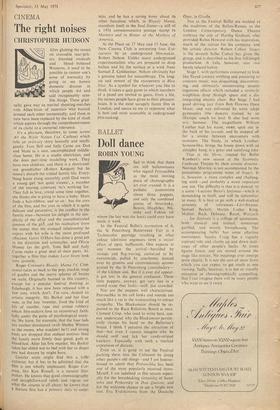CINEMA
The right noises
CHRISTOPHER HUDSON
After glutting the senses on crocodile tear-jerk- ers, frenzied musicals and blood - boltered Westerns, it used to be possible to restore one's sense of normalcy by going to see honest domestic dramas in which people did and said recognisably sens- ible things. These grad- ually gave way to marital shouting-matches with Albee-hives of neurotics who buzzed around each other tormentedly; and these in turn have been replaced by the kind of slush which aspires through the comprehensiveness of its cliche to a universal relevance.
It's a pleasure, therefore, to come across All the Right Noises ('AA' Carlton) which tells an ordinary story honestly and intelli- gently. Tom Bell and Judy Carne are • Dad and Mum in 'a nice, uncomplicated middle- class home. He is a studio electrician, and she does part-time modelling work. They have two children, and there is a down-and- out grandfather (Robert Keegan) but he doesn't disturb the sAtled family life. Every- 'thing hums along smoothly until Dad meets a young girl 'not quite sixteen', a member of the touring comnany he's working for. They fall in love, spend some time together, she thinks she is going to have a baby. Mum finds a hair-ribbon, and so on : but the core of the film, and the area in which it is quite delicate and perceptive, is the conflict in the family man—between his delight in the sim- plicity of the affair and the unsophisticated passion of the Rill, and his realisation from the outset that the tranquil relationship he enjoys with his wife is the more profound alTection. Gerry O'Hara has done a good job in the direction and screenplay, and Olivia Hussey (as the girl), Tom Bell and Judy Carne make a great deal of their parts. Al- together a film that makes Loge Story look very juvenile.
Roger Corman's Bloody Mama ('x' Cine- centa) takes us baCk to the pop, crackle, snap of gunfire and the merry splatter of brains on walls. Originally banned in this country, except for a popular festival showing at Edinburgh. it has now been released with a few cuts, which don't, I'm sure, despoil its artistic integrity. Ma Barker and her four sons, in the late 'twenties, lived the kind of life of murder, rape and armed robbery which film-makers love to reconstruct faith- fully under the guise of psychological analy- sis. We learn, for example, that the four lads are mother-dominated (with Shelley'Winters as the mama, who wouldn't be?) and strong hints are dropped that oedipal motives bind the family more .firmly than greed, guilt or blood-lust. After his first murder, Ma Barker takes her eldest son to bed with her to dispel any bad dreams he might have.,
Gentler souls might find this a trifle extreme; but it has to be admitted that the film is not wholly unpleasant, Roger Cor- man, like Ken Russell, is a natural film- . maker. He knows that good cinematography and 'straightforward relish and vigour are what the cinema is all about; he knows that a feature film has a primary duty to enter-
tain; and he has a saving irony about its other functions which, in Bloody Mama, manifests itself in the final frame—a still of a 1934 commemorative postage stamp In Memory and in Honor of the Mothers of A medal.
At the Place on 17 May and 15 June. the New Cinema Club is presenting four Eye- openers by an underground film-maker. Robert Nelson. Unlike many underground experimentalists who are prepared to drop ballast and hit the surface at a wink from Samuel Z. Goldsteiner, Nelson obviously has a genuine talent for misanthropy. The long- est and newest of the eyeopeners is Bleu Shut. As a symbol for whatever you like to think, it takes a quiz game in which members of a panel are invited to guess. from a list, the names people have given to their pleasure- boats. It is the most savagely funny film in London, and seems to me to represent what is best and most accessible in underground film-making.






































 Previous page
Previous page